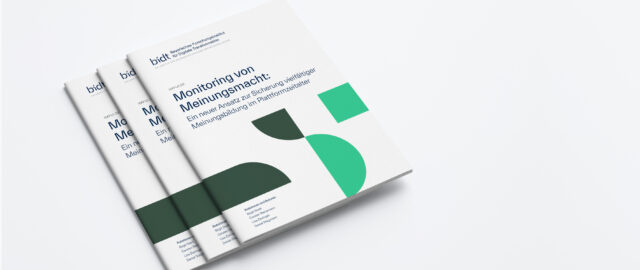Corona has also changed collaboration at bidt, and certainly permanently. An anonymous survey conducted in May 2020 among staff at the institute on their experiences with home office in the first weeks of the Corona crisis showed that no one wants to work exclusively in the office in the future. About two thirds of the participants in the survey would like two mobile working days. 20 per cent would like to have one day and 13 per cent three days when they do not work in the office.
47 per cent consider themselves more productive, 40 per cent about equally productive, if they work at a workplace of their own choosing outside the office.
From the management’s perspective, productivity has not suffered from working from home in recent months. The teams continue to work consistently on their goals.
In the long run, however, the necessary impulses from discussions with employees and, above all, external partners would certainly be lacking. Such discussions have been too scarce in the past months. That is why it is important that the presence in the office and in the public space at events increases again.
According to our survey, staff members appreciate spending the majority of their working time in the office with the team. For example, after months of working from home, they now like to return to their workplaces for a few days each week.
Our attempt to maintain collegial exchange during the long time in the home office by means of a virtual coffee break was not very successful; there was hardly any demand for it. Colleagues are now all the more interested in meeting each other again at the coffee machine in the office.
Hybrid meetings
The pure online communication of the past months has now often developed into a hybrid form of meetings with participants present on site and digitally connected. Many of our team meetings and board meetings now take place as hybrid events. Compared to purely face-to-face events, we achieve much greater participation in this way.
We also implement digital and analogue events with external attendance. An example of this took place in July: We had a real visit from a delegation from the Center for Advanced Internet Studies (CAIS) from NRW. At a distance of at least 1.5 metres, nine people sat together at the bidt location, and about twelve others were connected. In such a situation, the moderation is particularly challenged. Special consideration must be given to the external participants and care must be taken that everyone can be heard well.
In the test: digital tools and cloud solutions
Working at distributed locations places additional demands on our digital tools and processes. At events and beyond, we have digital collaboration in mind when selecting software tools. If workshops are conducted digitally, for example, a tool such as Miro is needed that enables people to work together on a virtual whiteboard.
It is also important to select and establish tools that make it possible to digitise all paper processes. While approval processes with an on-site signature were still somewhat acceptable for a transitional period, digital processes now urgently need to be introduced for approvals.
For the introduction of such processes, there are now a large number of established and, for the most part, interlinked cloud solutions available on the internet. We are currently analysing solutions for working on documents simultaneously, for personnel management, for funding management, for project management and for conducting digital workshops. In addition to functionality, interoperability (for example, the approval of the leave request should automatically lead to a calendar entry or the telephone application should access a central contact record), user-friendliness and price, the assessments of the data protection officer and the staff council must of course be taken into account when making a selection. Once the market research has been completed, the OK has been given by the data protection officer and the staff council, and the financing has been secured, the award procedure can begin, for which one has to calculate four weeks. So, unfortunately, the provision of even cloud solutions usually takes longer than users would like.
Meeting place office
The Corona crisis has meant that the sceptics of mobile working around bidt have been convinced of the benefits and we will therefore practice mobile working more in the long term.
We now see our office space more as a meeting place and as a result can handle more projects with more staff. Finally, working at distributed locations has also increased the pressure on us to digitise. The Corona crisis will therefore ultimately lead to more efficient work and an improved work-life balance for us.
Dr Herbert Vogler was Managing Director Organisation, Finance and Dialogue of bidt.




